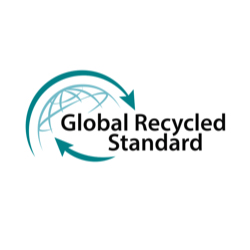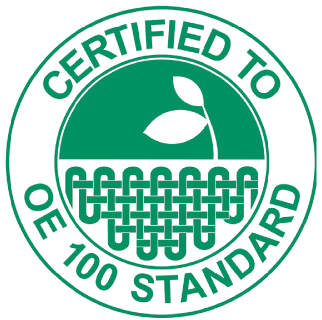- Clothes
- Bags
- Accessories
-
Inspiration
- Shoes
Global Recycled Standard

The Global Recycled Standard (GRS) is an international, voluntary standard with requirements for third-party certification of recycled input and chain of custody. The GRS was originally developed by Control Union Certifications (CU) in 2008 and ownership was passed to Textile Exchange in 2011.
The main goal of the GRS is to increase the use of recycled materials. Moreover, the other goals of GRS are:
- Alignment of definitions across multiple applications.
- Track and trace Recycled input materials.
- Provide customers (both brands and consumers) with a tool to make informed decisions.
- Reduce harmful impact of production to people and the environment.
- Provide assurance that materials in the final product are actually Recycled and processed more sustainably.
- Drive innovation in addressing quality issues in the use of Recycled materials.
The certification is intended to meet the needs of companies looking to verify the recycled materials in their products. Furthermore, they focus on environmental and chemical processing and safe and equitable workingconditions. This applies to finished and intermediate products. This includes companies in ginning, spinning, weaving and knitting, dyeing and printing and stitching in more than 50 countries.
The Global Recycled Standard is intended for use with any product that contains at least 20% Recycled Material.
How GRS scores on a scale of 1 to 4
Find out what's the story behind your clothing by understanding the certificates. Use the scores to discover at a glance what a certificate means in different sustainability areas.
“If it can’t be reduced, reused, repaired, rebuilt, refurbished, refinished, resold, recycled, or composted, then it should be restricted, designed or removed from production.”
Eco-Friendly
The criteria for environmentally friendly production apply at GRS for every step of the production process. It is always the case that the company must meet the criteria of GRS or local law, the strictest rules apply. GRS also checks that production is completely legal. That the local law is complied with and all permits are up-to-date.
The main environmental criteria of GRS are:
- At least 20% of the end product must consist of recycled material.
- Energy consumption must be researched and documented and there must be a plan be produced to make it more sustainable each year.
- Water consumption is examined and documented and a plan is made for annual improvement of water use. Waste water must first be sent to a water treatment plant before being dumped. A
- ir emissions are investigated and documented and a plan is drawn up for annually improving emissions.
- Waste must be handled responsibly. No waste may be incinerated or dumped on site. The certification organization will look at ways to minimize waste through reuse and recycling.
- They will then set goals for improving waste management that must be met annually.
- No chemicals that are harmful to health may be used (according to European Regulations).
Score: 2/4 The amount of recycled material can are quite low, namely only 20%. In addition, there are criteria for environmentally friendly production, but there are no hard limits, it must above all be in accordance with the law and be free of toxic materials.
Fair Trade

The GRS social criteria also apply to every step of the production chain. Here too, they check that production is in accordance with local law if those rules are stricter than those of the standard.
The main criteria of GRS in the social field are:
- There must be no forced labour.
- There is no child labour. No children will be accepted under 15 or the legal minimum age, whichever is higher. No dangerous work or night work is allowed under the age of 18.
- There is freedom to form unions and collective bargaining. If unionization is prohibited in the country where the company operates, it will accept other forms of employee representation.
- There will be no discrimination.
- There will be a safe and hygienic workplace, with access to first aid, toilets , drinking water, etc.
- The wage that is paid is equal to the minimum wage of that country, to the average wage in that industry in that country, or the wage that is agreed upon by collective agreements (by trade unions, for example). Whichever is greater applies.
- Overtime is subject to a premium rate, as determined by local law. Other secondary benefits that must be provided by law such as paid leave must also be provided.
- Working weeks include a maximum of 48 hours per week and there must be at least one day off per week. Overtime must not exceed 12 hours per week and must not occur on a customary basis.
Score: 3/4. GRS defined multiple requirements on social production, from clean and safe working conditions to the right to the freedom of association. Though, they do not score all points as they are for instance not arguing voor a living wage rather than a minimum wage.

Animal welfare/Vegan
The GRS does not include any requirements or advice on animal friendly or cruelty-free production.
Score: 0/4
Reporting and improvement
Textile Exchange releases a report on the Global Recycled Standard every 4 years. The report includes all the updated requirements. The latest report is from 2017 (Global Recycled Standard 4.0) and in 2021, a new report will be released. The reports are free and available for everyone online. The reports do not focus on the improvements of the certified GRS parties.
Score: 2/4. The reports are freely available, though only released once every 4 years. The report clearly outlines the GRS requirements but could also focus on the results and improvements of the certified parties.
Auditing
GRS has an international working group with various members from many different organisations, from GOTS to Control Union to H&M. In general, GRS is a third-party certification system. The audits are done by SCS global services, including on-site inspection of the facility in the process of applying for certification. After receiving the certificate, SCS requires annual surveillance audits to maintain the certification.
Score: 3/4. GRS is a third-party certification with a varied working group and annual audits. Though, the report does not review anything on these audits and their outcomes.
Check out other certificates

OEKO-TEX
OEKO-TEX

Bluesign
Bluesign

Responsible Jewellery Council
Responsible Jewellery Council